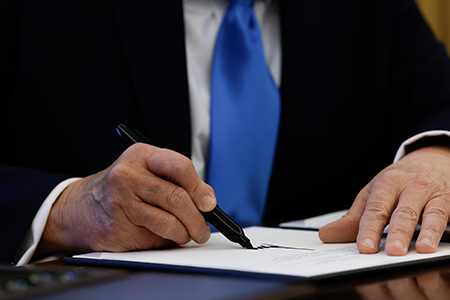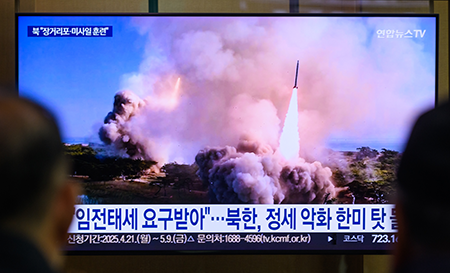U.S. President Donald Trump voiced optimism about a possible Iran nuclear deal, but there still appear to be significant differences over the scope of the agreement.
June 2025
By Kelsey Davenport
President Donald Trump said the United States and Iran are close to reaching a nuclear agreement after the two sides met for a fourth round of talks in Oman, but there still appear to be significant differences over the scope of the agreement.

During a May 15 business roundtable in Doha, Trump said that Iran has “sort of agreed to the terms” of a deal and will not make “nuclear dust.” Trump did not specify what “nuclear dust” is, but he may have been referring to Iran’s capabilities to enrich uranium.
Iranian officials have stated consistently that Tehran is willing to limit its enrichment program in an agreement with the United States but will not give up the capability entirely.
The United States has sent mixed messages about its position on Iran’s uranium enrichment program. After the first round of negotiations in April, Trump’s lead negotiator, U.S. Special Envoy for the Middle East Steve Witkoff, suggested that the United States could agree to a deal that allows Iran to continue enrichment, but later said a deal would prohibit enrichment. (See ACT, May 2025.)
Trump also has been inconsistent on the issue of enrichment. He told Meet the Press May 4 that “total dismantlement” of the nuclear program is “all I would accept.” He suggested that Iran does not need nuclear energy because of its oil reserves. But on May 7, when asked specifically about allowing Iran to retain a limited enrichment program, Trump said “we haven’t made that decision yet.”
Ali Shamkhani, an adviser to Iranian Supreme Leader Ayatollah Ali Khamenei, said in a May 14 interview with NBC that Iran is ready to sign a deal with the United States and reiterated that Iran is willing to limit uranium enrichment to low levels. He previously suggested in a May 7 post on X that any deal should include a “recognition of Iran’s right to industrial enrichment.” That recognition, plus the removal of U.S. and international sanctions, “can guarantee a deal,” Shamkhani said.
Iran is enriching uranium up to 60 percent uranium-235. Iran has no civil justification for enriching up to this level and could quickly enrich that material to weapons-grade levels, or 90 percent U-235.
Shamkhani said that Iran is willing to dispose of its stockpiles of highly enriched uranium and accept more intrusive monitoring by the International Atomic Energy Agency in exchange for the lifting of sanctions. Under the 2015 nuclear deal between Iran and the multilateral group known as the P5+1 (China, France, Germany, Russia, the United Kingdom, and the United States), Iran agreed to limit uranium enrichment to 3.67 percent U-235, a level suitable for power reactors; cap the stockpile of enriched material to about 200 kilograms; and restrict uranium enrichment capacity.
Trump reposted NBC’s report on Shamkhani’s interview on Truth Social.
The comments by Trump and Shamkhani followed a fourth round of negotiations between Witkoff and Iranian Foreign Minister Abbas Araghchi.
Araghchi described the May 11 talks in Oman as “more serious and candid” and told Iranian media that the sides now better understand each other’s positions.
He said Iran’s uranium enrichment program “must continue” under a deal, but the “scope and level may change.” Iran will not compromise on enrichment, he said. Before the talks he complained that the “constant change” in U.S. positions was a problem.
A senior U.S. official said the fourth round of talks was encouraging and the two sides agreed to continue working on “technical elements” of a deal.
Tehran may be considering regional options for addressing the question of enrichment. During the negotiations, Iran put forward a proposal to operate a joint uranium enrichment facility with Saudi Arabia and the United Arab Emirates, according to several Iranian news outlets. It is unclear how such a joint venture would work, but Iran may view a multilateral endeavor as less of a proliferation risk because additional states would be involved with the uranium enrichment program.
The United States denied that there were any discussions of a joint venture on uranium enrichment in Oman, and it is unclear if Saudi Arabia or the UAE would support such a plan.
The UAE operates four nuclear power reactors, and Saudi Arabia has announced plans to build two reactor units. Both countries expressed support for a nuclear deal with Iran.
During Trump’s May 13 visit to Riyadh, he said that a U.S.-Iran nuclear deal will “make your region and the world a safer place.”
Trump emphasized that there is not much time for negotiations and that Iran will continue to face economic pressure if there is no deal.
As part of the Trump administration’s ongoing pressure campaign, the U.S. State Department announced new sanctions on Iranian entities connected to the Organization of Defense Innovation and Research, which has ties to the organized nuclear weapons program in Iran that ended in 2003.
According to the May 12 department release, the sanctioned persons are involved in activities that “materially contribute to, or pose a risk of materially contributing to, the proliferation of weapons of mass destruction.”
The release also noted that Iran “continues to substantially expand its nuclear program and carry out dual-use research and development activities applicable to nuclear weapons.”


